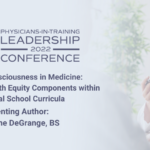Abstract | April 4, 2022
Critical Consciousness in Medicine: Developing Health Equity Components within Medical School Curricula
Learning Objectives
- Understand the contributing elements necessary for the development of a health equity workshop series within traditional medical education;
- Identify challenges, opportunities and limitations for health equity education;
- Appreciate the role that critical reflection plays in improving such curricula.
There has been increased focus on the structural forces that perpetuate systems of oppression in the United States. Within American medical education, standards for approaching these subjects have been fleeting. Questions of racism, sexism and the determinants of health inequity remain contentious due to their absence within traditional medical school curricula, as well as educators’ discomfort and unfamiliarity with such subjects. Yet, inequitable health care systems remain a principal driver of divergent health outcomes that cost the US economy billions of dollars per year. Thus, educational forums for future physicians to critically assess healthcare institutions and their relationship to inequities are essential to move the needle.
At the Louisiana State University Health Sciences Center (LSUHSC) School of Medicine in New Orleans, a novel workshop series was created and implemented by second year medical students in 2016. This student-led series initially included five workshops utilizing a combination of small-group and largegroup discussions on the topics of microaggressions, privilege, social determinants of health, and implicit bias. Since that time, the workshop series now known as Critical Consciousness in Medicine (CCM) includes eight workshops, covering additional topics from white privilege to LGBTQ+ health, as well as integrating case-based learning components, reflective writing, and guest speakers. Starting in the 2021-2022 academic year, the CCM workshops have been formally adopted as core curriculum for medical students at LSUHSC. What began as a small impetus for change became an integral component of medical education and training at LSUHSC. The development of this series has offered enormous insight into content-delivery approaches, as well as opportunities for critical reflection on institutional responsibility for teaching such essential subject matter.
In our presentation, we discuss how a workshop created by dedicated medical students transitioned into a full course for first and second year students at LSUHSC. We will outline the development of the CCM workshop series, its correspondence to new educational guidelines, lessons learned, student growth, and initial results of a qualitative evaluation.

